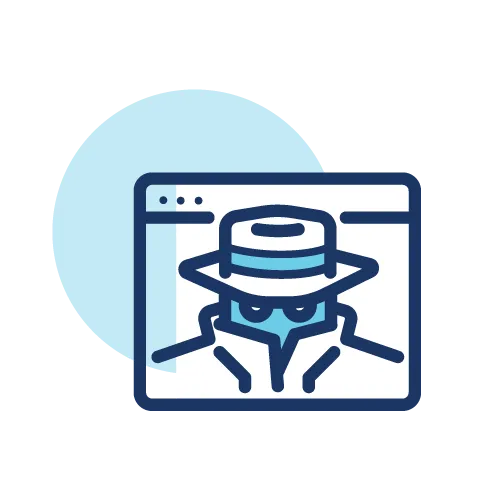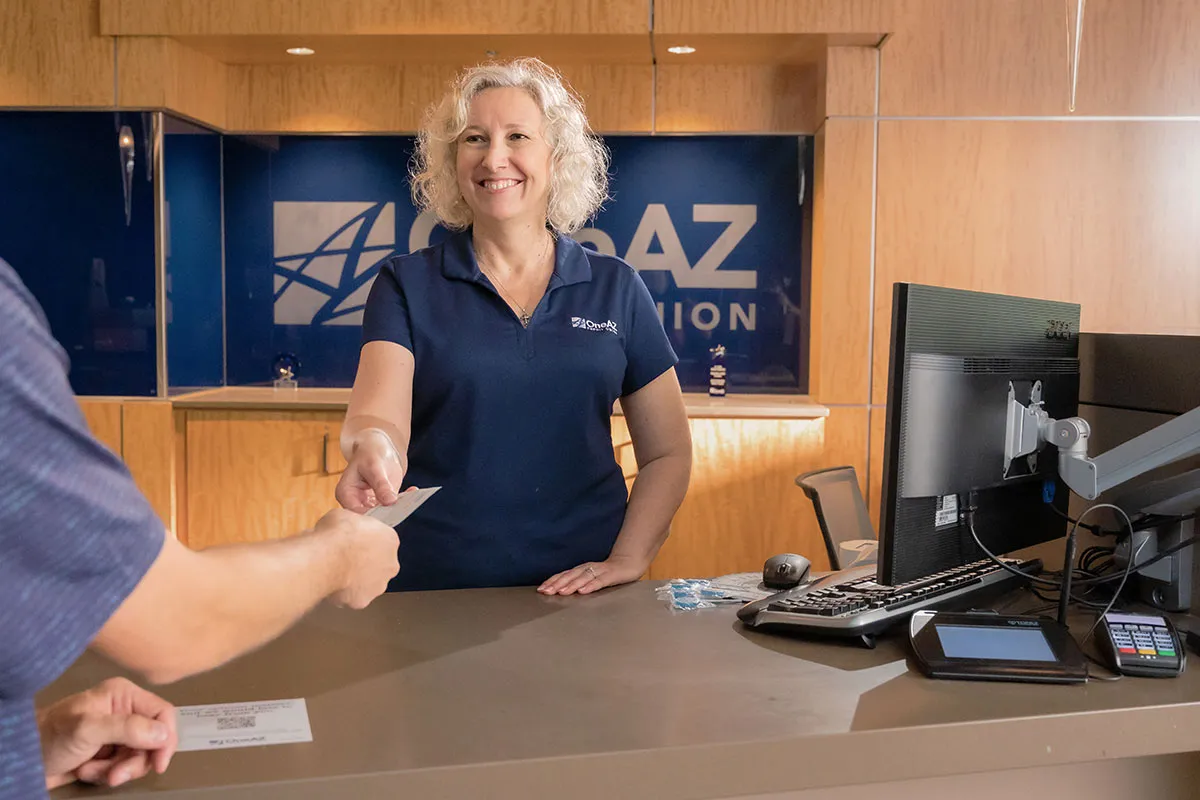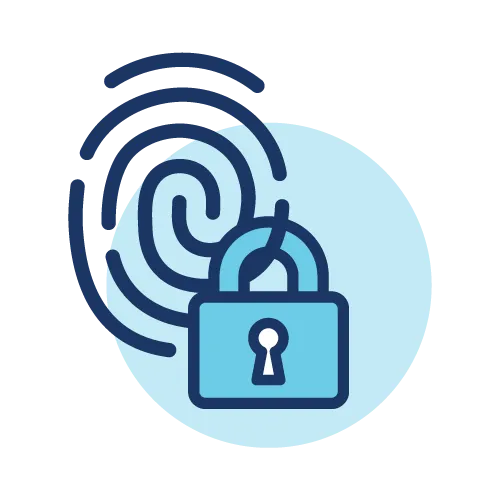Beware of scams.
We have received reports of individuals contacting our members by phone and claiming to be OneAZ associates.
These callers sometimes claim to need to verify account activity and ask members to provide personal information such as online banking usernames. That information is used to log in to the member’s account and transfer money.
Remember, OneAZ Credit Union will NEVER request your User ID, Password or any one-time PINs or codes needed to log in to online banking.
This information is personal to you, and we urge you to NEVER share that information with anyone. If you are unsure of the identity of a person claiming to be a OneAZ associate, hang up and call us back at our main number, 844.663.2928.
Thank you for the opportunity to serve you!

Best Practices to Prevent Fraud
You are the first line of defense against fraudulent activity. Review your accounts regularly and follow these best practices to help prevent fraud.
- Enable Two Factor Authentication: This feature helps reduce the risk of fraud by requiring more than just a password to access your account. Protect yourself from hacking attacks by requiring 2FA every time you log in to your online and mobile banking account.
- Create strong passwords: Use a unique password for every login you have, and avoid using personal information like your name, birthday, pet names, etc.
- Watch out for phishing attempts: Beware of emails or text messages that appear to come from legitimate companies or OneAZ and encourage you to share personal information. Common phishing signs include suspicious URLs, misspelled words and generic greetings. Remember, OneAZ Credit Union will NEVER request your User ID, Password or any one-time PINs or codes needed to log in to online banking.
- Set up notifications: Receive a text message anytime an Online Banking login is detected for your account.
- Protect One-time Passcodes: One-time passcodes are automatically generated numbers used for authentication when accessing or logging into some systems.
Never share your one-time passcode with anyone and delete the message after using the passcode. OneAZ associates will never ask you for your one-time passcode.
How to Create Strong Passwords
A strong password may prevent hackers from gaining access to your online and mobile banking accounts.
Follow these tips to create a password:
- Do not use personal information like your name, birthday, pet names, family names, hobbies or email address.
- Do not reuse a password from another account. If your password to another account is hacked, it puts your other accounts in danger.
- Do not use sequential or iterative passwords. For example, do not update your password from ILoveMyDog123 to ILoveMyDog124.
- Use a long password. Longer passwords are more difficult for fraudsters to crack.
- Use a password manager. A password manager gives you a secure place to digitally store your passwords.
- Add a unique pass phrase to your account. Add a pass phrase that only you will know. OneAZ will use this to verify your identity over the phone.

What to Do if You Are a Victim of Fraud
OneAZ Member Care Center: 844.663.2928
Debit Card Fraud – unauthorized transactions or a lost card
- Call the Member Care Center or visit a branch.
- Request to close your card immediately and file a dispute, if needed.
- Order a new card or have an associate print a new card in branch.
Online or Check Fraud
- The Member Care Center can freeze your account in cases of check or online banking fraud to allow time for you to secure your funds (often in a new account).
Identity Theft
If your Social Security Number has been compromised:
- Add a verbal password to your account profile. This will be asked each time you call the Member Care Center.
- Contact local law enforcement to report the details.
- Contact ChexSystems (ChexSystems.com) to freeze your debit profile.
- If your driver’s license or ID was stolen, contact the MVD to get a new ID number issued.
- Contact each credit bureau and place a fraud statement or freeze on your credit report.
- Experian: Experian.com/freeze or 888.397.3742
- Equifax: Equifax.com/personal/credit-report-services/creditfreeze/ or 888.298.0045
- Transunion: Transunion.com/credit-freeze or 888.909.8872
Get enhanced security features with Benefits Checking.
Minimize stress around fraud when you open a OneAZ Benefits Checking account.
- Credit Monitoring with Alerts: Get regular credit reports and real-time alerts when changes are made to your credit file.
- Identity Theft Recovery: Call 800.357.6392 and your personal privacy advocate will help you start a recovery case.
- Dark Web Monitoring Alerts1: Protect your private information with a monitoring service that alerts you when your passwords, emails, account info and more are found on the Dark Web.
Apply for a Benefits Checking account today.

Be on the lookout for these common scams.
Understanding how fraudsters work is the first step to being prepared and keeping your personal information secure. Here are a few common scams to look for:
Advance Fee (Money Mule) Scams
Be wary of companies that offer to pay you in advance and ask for partial payments in return. These are often scams set up to get money or account information from you. Examples may include employment scams and online purchase scams.
Overpayment Scams
These scams target consumers selling cars and other valuable items. The scammer will send the seller more than the asking price then ask the seller to forward funds to a third party or wire the ‘accidental’ amount of the overpayment back. This is a scam.
Financial Institution Scams
Some fraudsters might contact you claiming to be a representative of OneAZ or another financial institution. These scammers may even be able to “mask” their phone number to look like it’s coming from OneAZ. They may claim to have found a fraudulent charge on your account in order to get personal information from you and gain access to your account(s). For example, be aware of wire transfer scams.
Keep in mind that a OneAZ associate or a legitimate representative from any financial institution will never ask you for your debit card PIN or online banking password.
One-Time Passcode Scams
Be aware of anyone who requests your one-time passcode, even if they claim to be a representative of your financial institution. This code is created for your security, and you should never give it to anyone. OneAZ will never contact you to ask for your one-time passcode.
Electronic Scams
Look out for someone claiming to be from a reputable technology company. They may ask for control of your device, like a computer, phone or tablet, with the excuse of removing malware or a virus. These scammers will then access your personal information, records, and financial accounts.
Romance Scams
These scams are extremely common, and often start online. A fraudster may claim to be interested in a romantic relationship with you, then ask you to send them money to help them out.
Online Shopping Scams
These scams begin with a purchase from what appears to be a reputable company, which will then attempt to get you to share your banking information with them. Identity scams and fake companies by reading consumer reviews before purchasing something from a company you’re unfamiliar with. Legitimate companies will never ask for banking information like Usernames, Passwords and PINs.
Lottery Scams
Have you ever received a call or email claiming you won a big cash prize? These can be tempting but be wary—if you are asked to pay taxes or a prize collection fee, this is a scam.
Government Scams
If you receive a call or email from an individual claiming to be a representative from the IRS, Treasury, Department of Economic Security or other government agency, do not share any personal information. Remember, the first communication you’ll receive from the IRS and many other government agencies is always by mail, not by phone.
OneAZ is here to help.
If you believe you have been a victim of a scam or fraud, contact our team immediately.
1 Monitoring services are provided to the primary account holder on an entitled basis and require consumer activation. For additional details about the services, including terms, conditions, and limitations, please visit oneazcu.nxgstrategies.com.


